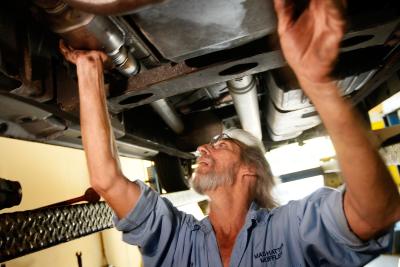
The catalytic converter on your 1997 Jeep Grand Cherokee Limited will last for years as long as your engine is operating at peak efficiency. When your engine does not have the correct fuel mixture, excess fuel will enter the catalytic converter, causing the temperature to increase. The combination of excess heat and road stress can destroy a catalytic converter. Defective converters cause lower fuel economy and reduced engine power.
Catalytic converters use chemicals such as rhodium and palladium to reduce the levels of oxidized hydrocarbons and carbon monoxide that your Jeep engine produces. The result of this process is that hydrocarbons and carbon monoxide are converted to water and carbon dioxide. Environmental Protection Agency regulations also require catalytic converters to reduce the levels of oxides of nitrogen that are emitted from your Jeep's exhaust. A defective catalytic converter will cause your 1997 Jeep Cherokee Limited to fail state-mandated emissions tests.
The catalytic converter on your Jeep works with the oxygen sensors to send electrical signals the powertrain control module uses to adjust the fuel mixture entering the cylinders. The downstream oxygen sensors measure the oxygen and unburned fuel leaving the converter. If the downstream sensor senses a lean fuel condition, it will signal the engine to run richer. Increased unburned fuel reaching the converter will cause it to heat up excessively. An overheating converter will cause the downstream oxygen sensor to send erratic signals to the PCM, significantly reducing fuel economy.
Fuel-rich exhaust gasses reaching your Jeep's catalytic converter can cause internal thermal meltdown. A meltdown condition will cause the catalyst chemicals to cease working. A complete internal meltdown will eventually block the flow of exhaust gasses through the converter. As the blockage in your catalytic converter progresses, you will notice decreased engine power because exhaust gasses from your engine will not be able to flow through the exhaust system. A completely blocked catalytic converter will cause your engine to stall within a few seconds after you start the engine.
The exhaust system on your Jeep Cherokee is exposed to many road hazards and operational loads. Just like mufflers and tailpipes, the metal on your catalytic converter is subject to rust and corrosion. Over time road elements can destroy the metal housing on a catalytic converter. Internal components are subject to shocks from rough roads and may break loose and rattle or vibrate. A converter that has been destroyed because of overheating may make whistling noises as exhaust gasses try to get through blocked passages. Noises emanating from your catalytic converter should not be ignored.